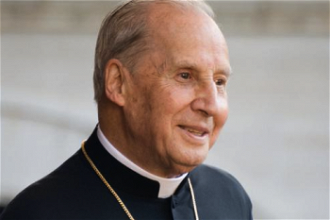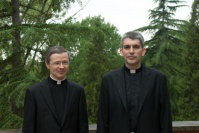Opus Dei begins election process for new prelate

Saint Josemaría Escrivá
The process planned for the election and appointment of the prelate of Opus Dei will begin in Rome on January 21. Once he has been confirmed by the Pope, the new prelate will become the third successor of Saint Josemaría Escrivá (1902- 1975), and will take over the position held by Bishop Javier Echevarría, who died in Rome on December 12.
The auxiliary vicar of the prelature, Monsignor Fernando Ocáriz, stated: "We are living this period in an attitude of prayer, going especially to the Holy Spirit."
He added: "We live these days very close to the Holy Father Francis and the whole Church, of which Opus Dei is a small part. Of course, we feel a strong sense of gratitude for the pastoral work and the good example given by Bishop Javier Echevarría."
Only a priest can be elected as the prelate. He must be at least forty years old and a member of the Congress of electors, and incorporated in the prelature for at least ten years and a priest for ve years. There are currently 94 priests, from 45 countries, who meet these requirements.
Among them are numerous regional vicars (representatives of the prelate in each country or circumscription) as well as other priests who work or have worked in the pas- toral work of Opus Dei in Rome or in the 49 circumscriptions of which the prelature is currently composed.
The statutes of the prelature describe the various human, spiritual and juridical qua- lities the prelate must possess to ensure that this responsibility is carried out suitably. In summary, he has to stand out for the way he lives the virtues of charity and prudence, for his life of piety, love for the Church and her Magisterium, and delity to the spirit of Opus Dei. He also needs to possess a deep culture, both in ecclesiastical and civil studies, and the requisite gifts for pastoral government.
The electoral process involves both women and men and concludes with the confirmation of the election by the Pope.
The electoral process begins with a plenary meeting of the women's council of the prelature, called the Central Advisory, which will take place starting January 21. The elec- toral Congress begins on January 23. In total 194 faithful of Opus Dei will participate in the process. They will include both priests and lay people, at least 32 years old, who have been in the prelature for at least nine years. They have been appointed from among the faithful of the prelature in the various countries where Opus Dei is carrying out its pastoral work.
In the Central Advisory, each member submits a list with the name or names of those priests in the electoral Congress seen as best suited for the position of prelate. The members of the Congress, keeping these recommendations in mind, then proceed to the voting process. Once the election has been concluded and the person chosen has accep- ted, he, in person or through someone else, asks the Holy Father for confirmation, as the Pope is the one who appoints the prelate of Opus Dei.
Once the prelate is elected, the participants in the Congress meet for several days for the selection of the members of the central councils who assist the prelate in the government of the prelature. Finally, the members of the Congress examine the state of the prelature and its apostolic activities around the world. The proposals are studied in plenary sessions, which determine the guidelines for the government of the prelature during the eight-year period until the next ordinary general congress.
Updated information on the various phases of the Congress will be available on the Opus Dei website: www.opusdei.org.uk/

















